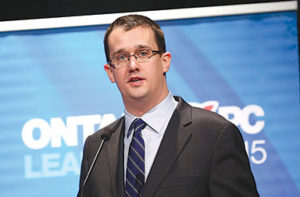“I’m on a mission to make sure we’re spreading opportunity more fairly and widely”
- Monte McNaughton
Labour Day 2021 will once again be a holiday without the traditional parades and fairs that used to bring thousands of people together to colour and enliven the streets of Toronto. As we navigate through the fourth wave of the pandemic, large gatherings are still not advised, with the current threat identified as the delta variant. Traditionally, this is the time of the year to highlight the achievements of workers over the years, and of course, to discuss what improvements can and should be made to make Canadian workers’ lives better.

In Canada, especially in Ontario, we are currently experiencing a gradual economic recovery, with unemployment rates still high, although at the same time, some sectors are suffering from a lack of skilled workers or even to find people willing to return to work. In fact, a lot has been changing in the labour world because of the pandemic. Currently, companies are demanding proof of vaccinations from their workers, both in public and private sectors; workplaces had to enhance their facilities to adjust to new health safety rules; some jobs are now completely remote, so an office is no longer needed.
In this edition, dedicated to Labour Day, we interviewed Ontario’s Minister of Labour, Training and Skills Development, Monte McNaughton, who told us about the government’s projects and gave us his perspective on issues such as the current situation of workers in the province, minimum wage, the recovery of jobs, the importance of programs related to improving professional skills and safety in the workplace, among other current topics.
Milénio Stadium: According to recent data from Statistics Canada the unemployment rate in Ontario fell 0.3 percentage points to 7.5% in July, lower than the recent peak of 9.4% in January 2021. Is that a sign of recovery and means the worst effects of the pandemic are in the past?

Minister Monte McNaughton: Our government is committed to helping employers find the skilled workers they need to grow their businesses and serve their communities. We’re transforming our training to provide workers with the skills needed for the bigger paycheques that are waiting for them. For example, we’ve revamped our Second Career program to focus on shorter training that matches local job openings. This program helps workers with up to $28,000 for tuition and living expenses.
MS: Unemployment rate is still very elevated, but some sectors such as retail, hospitality and restaurants have reported difficulties in hiring personnel. Some people believe the causes are the generous federal government support, the risks of contracting covid-19 in some work environments, the growth of work from home jobs, among other reasons. How do you analyse that situation, and do you think that is a risk of an imminent lockdown again, which means business have to shut down and we’re going to have a lot of job losses all over again?
MM: While more jobs are opening every day, it’s clear COVID-19 has changed where and how people do their jobs, with some workers at risk of falling through the cracks. Ontario’s Workforce Recovery Advisory Committee is a team of leading experts who were appointed to prepare recommendations on the future of work. We will ensure every worker has access to meaningful job opportunities. The Committee met with workers, community groups and businesses across Ontario to hear over 100 perspectives on the challenges we face. People in Ontario are doing their part to help us stay safe. We must all remain vigilant to COVID-19 both on and off the job.
MS: The pandemic has outlined the problem of house affordability, especially in big cities like Toronto. Recent research and studies show that for those living with minimum wage is almost impossible keeping up with the cost of living in some Ontario’s cities. The minimum wage rate in Ontario is currently $14.25 per hour and starting on October 1, 2021, is expected to increase to $14.35. Is that enough?
MM: Good meaningful jobs change lives, strengthen our families and build better communities. I’m on a mission to make sure we’re spreading opportunity more fairly and widely. In April, our province had over 250,000 jobs going unfilled, which costs our economy over $24 billion in lost productivity. Many of these jobs are in industries such as construction and the skilled trades, often paying six figures and a pension. I’ve seen firsthand the difference these jobs can make. Whether it’s a single mother of three finding work as a mechanic and being able to afford a house for the first time, or a young man from a broken home becoming an electrician and earning $44 an hour to build a new life, these jobs are truly life-changing.
Connecting other workers with the skills needed for jobs like these, which we know are available, is the best way to give people a hand up to support themselves and their families. Ontario’s minimum wage is the third highest in Canada, behind only Alberta and BC. Our government gave workers and businesses a predictable minimum wage tied to the cost of living. This is a fair and balanced approach that gives everyone certainty as the economy recovers from the COVID-19 pandemic.
MS: What are the Ministry policies related to work safety environment? Is your team conducting frequently work inspections, especially in schools, where a great number of professionals, like teachers and staff are getting ready to go back to in person classes?
MM: The health and safety of every worker is my number one priority and Ontario continues to be one of the safest places in the world to work. My ministry responds to every question we receive relating to COVID-19 and investigates all complaints related to workplace health and safety. In addition to responding to complaints, our inspectors have and will continue to conduct proactive inspections at workplaces such as restaurants, bars, factories, and schools. We focus our inspections on businesses and local hot spots where there is a greater risk of COVID-19. To beat COVID-19 once and for all, we all need to do our part. I’m happy to say data from our inspections continues to show the vast majority of workers and customers are following the rules. Since the start of the pandemic, our inspectors have conducted over 62,400 COVID-19 related field visits, issuing over 73,900 orders on those visits. Anyone with a concern can report it to our Ministry so we can investigate.
MS: A lot of big companies and government workplaces have already imposed the mandatory vaccination policy to workers. Is that the only way we can guarantee a full economic reopen and recovery in Ontario?
MM: Our Ministry continues to work closely with the Ministry of Health, Public Health Ontario, and our regional healthcare partners to support the vaccine rollout. Vaccines are our best protection against COVID-19 and the Delta variant and will be crucial to our full economic reopening and recovery.








Redes Sociais - Comentários